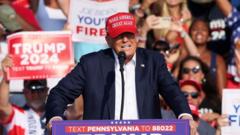Brazilian President Luiz Inácio Lula da Silva has announced a commitment to retaliate against any new US tariffs following President Trump's warning of a 50% levy. Lula insists on Brazil's sovereignty and challenges Trump's characterization of trade deficits, while also confronting the growing political tensions between the two nations regarding former President Jair Bolsonaro.
Brazil Prepares to Retaliate Against Proposed US Tariffs Amid Political Tensions

Brazil Prepares to Retaliate Against Proposed US Tariffs Amid Political Tensions
In response to President Trump's threats of a 50% tariff on Brazilian goods, President Lula vows to impose reciprocal tariffs while defending Brazil's sovereignty and addressing Bolsonaro's ongoing trial.
Brazilian President Luiz Inácio Lula da Silva has publicly vowed to match any tariffs that President Donald Trump threatens to impose on Brazilian imports, following a Wednesday announcement where Trump indicated a steep 50% import tax would be enacted on goods from Brazil beginning on 1 August. This harsh measure comes amid political discord, stemming from the trial of former Brazilian President Jair Bolsonaro, who is accused of attempting a coup after losing the 2022 election to Lula. Trump, who considers Bolsonaro a close ally, criticized Brazil for its treatment of the ex-leader, calling for an end to what he referred to as a "witch hunt" against Bolsonaro.
In response, Lula took to social media platform X to assert Brazil's status as a "sovereign country" with autonomous institutions, firmly rejecting any external pressure or intervention. He further remarked that any unilateral tariff hikes from the United States would prompt Brazil to retaliate with corresponding tariffs on American goods, which could significantly impact trade dynamics between the two nations.
Currently, the US ranks as Brazil's second-largest trade partner, following China. If Trump's anticipated tariffs take effect, they would increase from a rate of 10% to a staggering 50%, potentially inflicting considerable damage on Brazil's economy. Conversely, Lula contested Trump's claims regarding trade deficits, backing his argument with US government data indicating that Brazil contributed to a trade surplus of $7.4 billion for the US in 2024.
Beyond Brazil, Trump's tariff threats extended to several other nations, including Japan, South Korea, and Sri Lanka, suggesting a broader strategy of increasing tariffs. However, the communication directed specifically at Brazil was notably intertwined with Trump’s political sentiments towards Bolsonaro. He criticized Brazil's judiciary actions against various social media platforms, linking them to broader free speech concerns that resonate with his political base.
Lula defended Brazil's stance on social media regulation, justifying these measures while highlighting Brazilian society's rejection of hate speech and anti-democratic rhetoric. Political analysts suggest that while Trump's approach may be politically motivated, it could inadvertently bolster Lula’s domestic support, as historical patterns indicate increased favorability for leaders who push back against external pressures. Experts assert that the response from Lula’s government will be crucial in shaping perceptions and political outcomes both within Brazil and in its international relations moving forward.





















